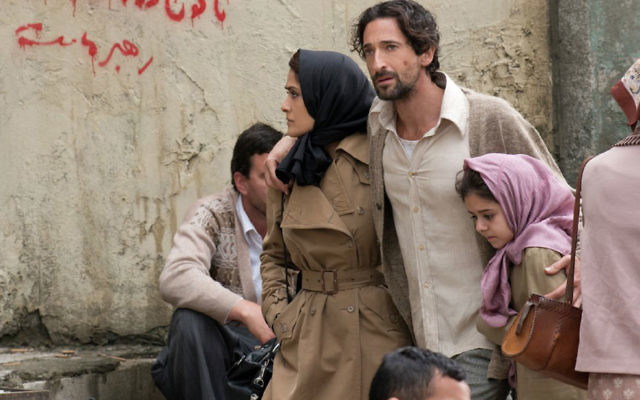Terror of the Iranian revolution
The powerful film Septembers of Shiraz is set in Iran during the early days of the Iranian Revolution as a wealthy Jewish diamond and gem merchant gets caught up in the chaos. Read Don Perlgut’s review.
FILM REVIEW of Septembers of Shiraz by Don Perlgut — Based on true events, the film Septembers of Shiraz had its genesis as a novel by Iranian-born, New York-based Jewish author Dalia Sofer, who moved to America aged 11 after experiencing the 1979 Iranian Revolution firsthand as a child.
Wealthy Jewish diamond and gem merchant Isaac Amin (Adrien Brody) and his wife Farnez (Salma Hayek) have done well in pre-Revolutionary Iran.
When the film opens in August 1979, the Islamic Revolution has been going on for some months and they are about to send their teenage son Parviz to study in the US at a private boarding school.
The streets of Tehran are full of violent demonstrations, but the secular, apolitical Amin family presumably feels immune from the political unrest.
However, one day Isaac is “arrested” at work by Revolutionary Guards and taken to prison, where he is questioned about his numerous trips to Israel to visit family.
The interrogators are critical of his “decadent” lifestyle, regarded as symbolic of the elite business class which aided and abetted the regime of the Shah.
The Revolution, in this instance, is portrayed primarily as an Islamic rebellion of the downtrodden working class, rather than concerned with persecuting Jews and other religious minorities.
Septembers of Shiraz illustrates this issue through a series of increasingly tense conversations between Farnez and the family’s long-time Muslim maid, Habibeh, played with great dignity by US-based Iranian actress Shohreh Aghdashloo, who left Iran in 1979 after the Revolution.
These scenes are the most interesting in the film, although the script never quite develops the themes of social and economic class, humility and gratitude.
While in prison, Isaac is brutally tortured and is only released after agreeing to give the family’s life savings to his captors.
The final part of the film follows the Amin family’s attempts to flee Iran for Turkey.
Septembers of Shiraz manages to keep up a good pace, with a specially energetic performance from Brody (who is part-Jewish), whose haunted and hunted characterisation is in the vein of his Oscar-winning role of Polish-Jewish Władysław Szpilman in The Pianist.
Despite its slick production style, the film is hampered by the challenges of portraying 1979 Iran on a limited budget: it was shot in Bulgaria with a mixed cast of Americans, Iranian exiles, Bulgarians and Israelis. It is directed by Indigenous Australian director Wayne Blair (The Sapphires).
Septembers of Shiraz captures the chaos of the early stages of the Iranian Revolution, but is less successful in making a connection to present-day events, and fails to indicate what happened to the almost 100,000 Jews who lived in Iran at the time.
Septembers of Shiraz is currently screening.


comments